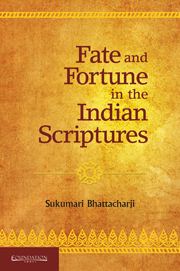Book contents
- Frontmatter
- Contents
- Preface
- Introduction
- Chapter 1 Inception
- Chapter 2 Rebirth and Transmigration
- Chapter 3 Karman and its Consequences
- Chapter 4 Karman, Fate and Free Will
- Chapter 5 Fate, Eschatology and Liberation
- Chapter 6 Premonitions and Presages
- Chapter 7 Deflection: Remedial Measures
- Chapter 8 Vicarious Deflection
- Chapter 9 Fate and Human Endeavour
- Bibliography
- Index
Chapter 7 - Deflection: Remedial Measures
Published online by Cambridge University Press: 05 October 2014
- Frontmatter
- Contents
- Preface
- Introduction
- Chapter 1 Inception
- Chapter 2 Rebirth and Transmigration
- Chapter 3 Karman and its Consequences
- Chapter 4 Karman, Fate and Free Will
- Chapter 5 Fate, Eschatology and Liberation
- Chapter 6 Premonitions and Presages
- Chapter 7 Deflection: Remedial Measures
- Chapter 8 Vicarious Deflection
- Chapter 9 Fate and Human Endeavour
- Bibliography
- Index
Summary
A ritual act which aims at establishment or exoneration of imputed guilt is the ordeal, ‘satyakriyā’, the act of truth. It is an indirect appeal to fate or the invisible agencies which act and control human destiny. When falsely accused, a person sometimes appealed to the elements in nature and to supernatural powers to bear witness to his or her innocence. “Forms of ordeal and the whole theory of the oath as well as its practice up to the latest stages of civilization depend on the principle of the conditional curse often embodied in symbolic action. An oath may be regarded as essentially a conditional self-imprecation, a curse by which a person calls down upon himself some evil in the event of what he says being untrue. All the resources of symbolic magic are drawn upon in the multitudinous examples of this principle… The oath carries with it the punishment for perjury. In ancient states all laws were accompanied by a curse upon the transgressor… Law gradually takes over the function of the curse, as a form of retribution.” In India the ordeal is first met with in the Ṛgveda where a person calls death upon himself if he is a monster as his enemy apparently accuses him of being. Now he calls upon the supernatural agencies which are in charge of life and death to prove his innocence (i.e. he is a man and not a monster) and if he truly is a monster as the accuser says, may death be visited on him that same day. How does he expect this to happen? He has an innate faith in some sort of cosmic justice operative in the world, in a fate whose visitations are morally balanced. Hence this oath.
- Type
- Chapter
- Information
- Fate and Fortune in the Indian Scriptures , pp. 185 - 224Publisher: Foundation BooksPrint publication year: 2014

